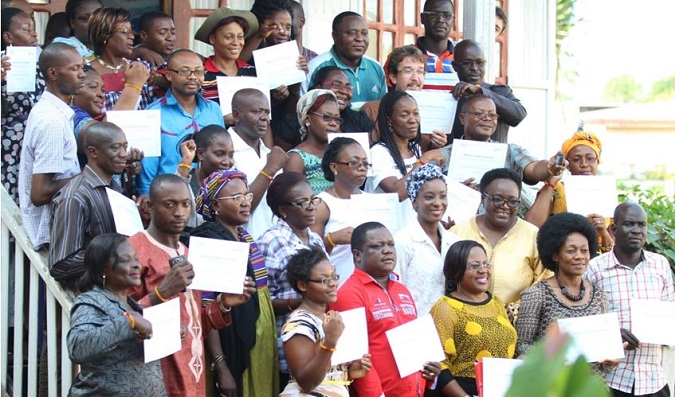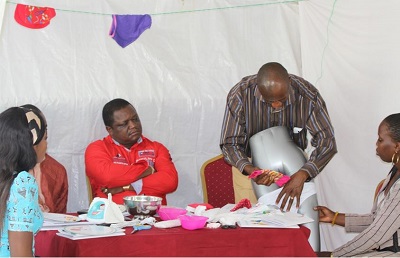UN Women, WSSCC Promote Menstrual Hygiene Management in Cameroon
Date:
Key stakeholders have pledged to promote menstrual hygiene management in their respective domains in Cameroon and Senegal.

Kribi-Cameroon, June 4, 2016: Over 45 participants drawn from the government, UN agencies, International organizations and the civil society in Cameroon and Senegal have received end of course certificates on Menstrua Hygiene Management (MHM). They received the end of course attestations following a five-day workshop which was jointly organized by the United Nations Entity for Gender Equality and the Empowerment of Women (UN Women) Cameroon and the Water Supply and Sanitation Collaborative Council (WSSCC) from May 30 to June 4, 2016 in Kribi, Cameroon.
Speaking on behalf of the Representative of UN Women Cameroon, Mrs. Beat Paulet Songue said the main objective of the workshop is to reinforce the capacity of key government officials involved in water and sanitation, health, education and environment that can in return train their colleagues in their respective institutions and are capable of acting as catalysts in ensuring that menstrual hygiene management is integrated in the national sectorial policies in Cameroon.
“This workshop is hinged on three important points; breaking the silence, Safe and hygienic management of menstruation and proper elimination of menstrual waste”, explained Rockaya Aidara, Program Officer- WSSCC.
Mrs. Mbarou Gassama, Program Coordinator for Gender Hygiene and Sanitation, Regional office of UN Women for West and Central Africa told participants during the opening ceremony that UN Women and WSSCC are working together to implement the joint program on Gender, Hygiene and Sanitation in West and Central Africa, which is aimed at changing policies and behaviors in the region to improve women and girls’ human right to water and sanitation.

At the end of the training, the 45 participants were trained on the existing relationship between MHM and the SDGs, how to identify strategies in integrating MHM in the national public policy, but also on how to better explain the necessity and importance of MHM to the public.
“This training was just timely, immediately I go back to my ministry which is the Ministry of environment, nature protection and sustainable development, I will carry out sensitization on MHM, I will equally ensure that MHM is integrated in the National Plan for Waste Management which is about to go operational”, says Ndipakem Ayuk ARREY, one of the participants.
The representative of the Senior Divisional Officer of the Ocean, Nko’o Ella Josiane, who officially opened the workshop stressed that “the Cameroon government is willing to consider and integrate concrete proposals to promote MHM in Cameroon”.
This training comes after a series of other UN Women Cameroon and WSSCC joint activities, notably; trainings and the realization of a study in 2014 titled “Menstrual Hygiene Management: Behavior and Practices in Kye-Ossi and Bamoungoum, Cameroon”.